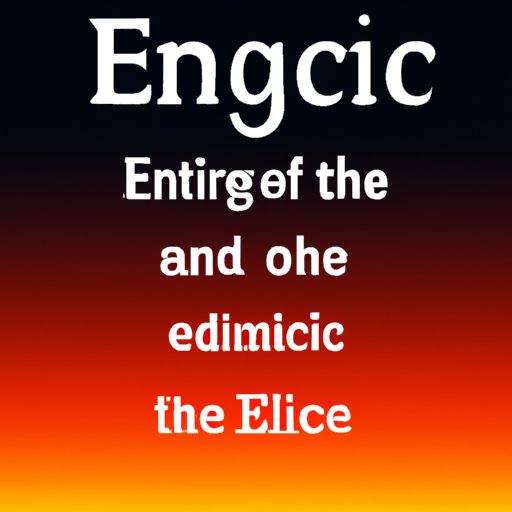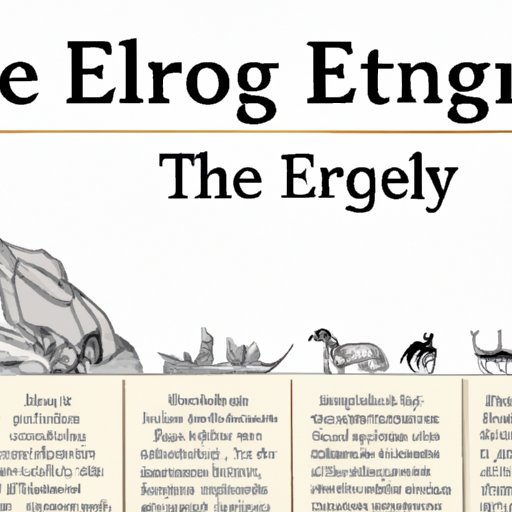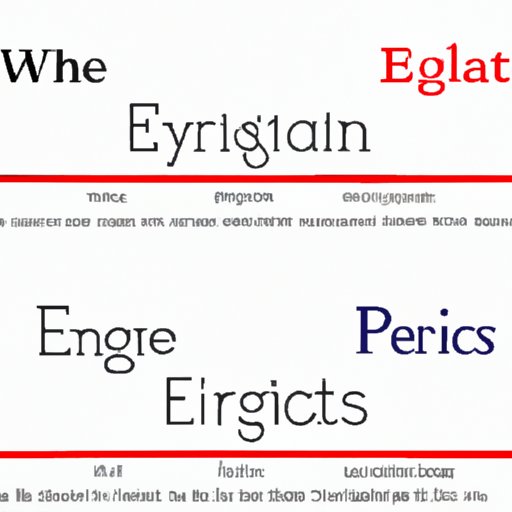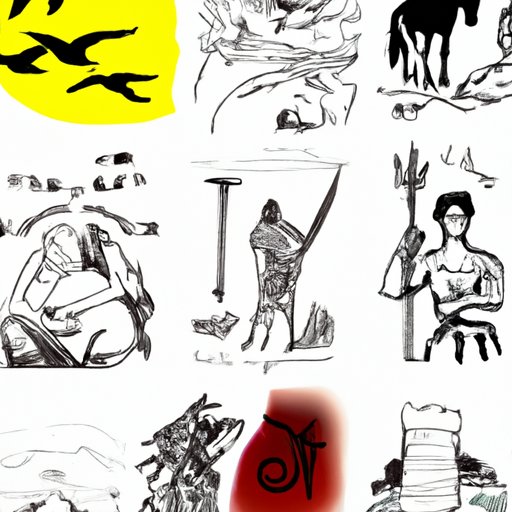Introduction
An epic is a long narrative poem that tells the story of a heroic figure’s journey. The genre has been around for thousands of years and can be found in the literature of many different cultures. In this article, we’ll explore what makes an epic in literature, take a look at some of the most famous examples, and discuss how the genre has evolved over time.

Definition of an Epic in Literature
The word “epic” comes from the Greek word “epos,” which means “word” or “speech.” In literature, an epic is a lengthy narrative poem that celebrates the deeds of a legendary or historical hero. The hero is usually of national or cultural importance, and his or her actions are meant to reflect the values, beliefs, and struggles of a particular people.

Overview of the History and Origin of Epic Literature
Epic poetry dates back to ancient times, when oral storytelling was the primary form of entertainment. The earliest known epic poem is the Epic of Gilgamesh, which was written in Mesopotamia around 2000 BCE. This poem tells the story of the Sumerian king Gilgamesh and his quest for immortality. Other early epics include the Epic of Atrahasis and the Epic of Creation, both of which were written in ancient Babylon.
In the Western world, the first great epic was Homer’s Iliad, which was composed around the 8th century BCE. This poem tells the story of the Trojan War and the hero Achilles. Another famous example from this period is the Odyssey, which tells the story of Odysseus’ journey home after the war. These two works set the standard for epic poetry in the West, and their influence can still be seen in modern literature.
Exploring Epic Genre Conventions
Epic poems share certain conventions that help define the genre. One of these is the use of elevated language, which is often filled with metaphors, similes, and other figures of speech. Epics also typically feature supernatural elements, such as gods, goddesses, and other mythical creatures. Finally, epics tend to focus on grand themes, such as honor, courage, and loyalty.
Characteristics of Epic Poems
Epic poems typically have certain characteristics that help to distinguish them from other types of poetry. These include:
- A hero who is of national or cultural importance
- A lengthy narrative structure
- Elevated language and style
- Supernatural elements
- Grand themes
Epic Heroes and their Journeys
At the heart of every epic poem is a hero whose journey is central to the story. The hero is usually someone of great renown and is often referred to as a “superhero.” He or she embarks on a long and difficult journey, often facing obstacles along the way. The hero’s journey is often symbolic of a larger struggle or conflict, such as a nation’s fight for freedom or a people’s struggle against oppression.

Comparing Epic Poems Across Different Cultures
Epic poems have been written in cultures around the world. While each culture has its own unique version of the genre, there are certain features that are common to all epic poems.
Ancient Greek and Roman Epics
Ancient Greek and Roman epics are among the most famous examples of the genre. These works often feature gods and goddesses as well as heroic figures such as Hercules and Aeneas. Some of the most famous examples include Homer’s Iliad and Odyssey, Virgil’s Aeneid, and Apollonius of Rhodes’ Argonautica.
Indian Epic Literature
India has a rich tradition of epic poetry, which dates back to the Vedic period (1500-500 BCE). The Mahabharata and Ramayana are two of the most famous Indian epics. These works tell the stories of the Pandavas and Rama, respectively, and are filled with moral lessons and philosophical reflections.
Other Epic Poems from Around the World
Epic poems have been written in many other cultures as well. For example, the Middle East has a long tradition of epic poetry, including the Persian Shahnameh and the Arabic Thousand and One Nights. In China, the Romance of the Three Kingdoms is an important work of epic literature. And in Japan, the Tale of Genji is widely regarded as one of the greatest works of Japanese literature.
A Look at Contemporary Epic Literature
Epic poetry is still alive and well in the modern world. Many contemporary poets have taken up the mantle of the epic, creating works that draw on the conventions of the genre while incorporating modern themes and sensibilities.
Examples of Modern Epic Poems
John Milton’s Paradise Lost is one of the most famous examples of modern epic poetry. This work tells the story of Adam and Eve’s fall from grace and their subsequent expulsion from the Garden of Eden. Other examples of modern epics include T.S. Eliot’s The Waste Land, Ezra Pound’s Cantos, and Derek Walcott’s Omeros.
How Contemporary Epic Poems Differ from Traditional Versions
Modern epic poems often differ from their traditional counterparts in terms of length and subject matter. Whereas traditional epics focus on grand themes such as honor and courage, contemporary epics often deal with more personal subjects, such as love, loss, and identity. Additionally, modern epics tend to be shorter than their traditional counterparts, making them more accessible to modern readers.
Conclusion
In conclusion, an epic is a long narrative poem that tells the story of a heroic figure’s journey. This genre has been around for thousands of years, and it can be found in the literature of many different cultures. Epics share certain conventions that help define the genre, such as the use of elevated language, supernatural elements, and grand themes. Contemporary epic poetry draws on the conventions of the genre while incorporating modern themes and sensibilities. This article has explored the history and conventions of epic literature, as well as how epics have evolved over time.
(Note: Is this article not meeting your expectations? Do you have knowledge or insights to share? Unlock new opportunities and expand your reach by joining our authors team. Click Registration to join us and share your expertise with our readers.)
